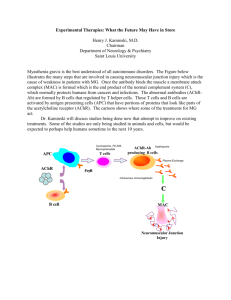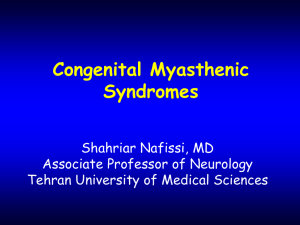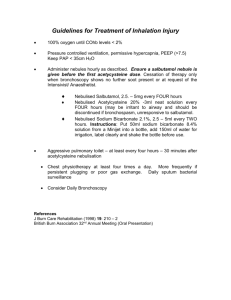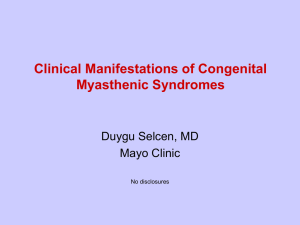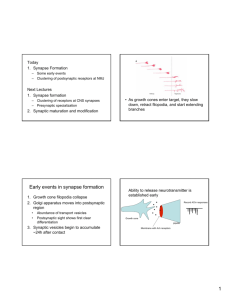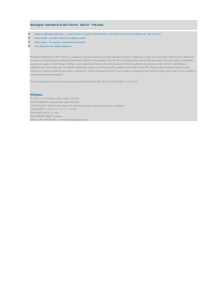Overview of new CMS classification and implications for treatment
advertisement
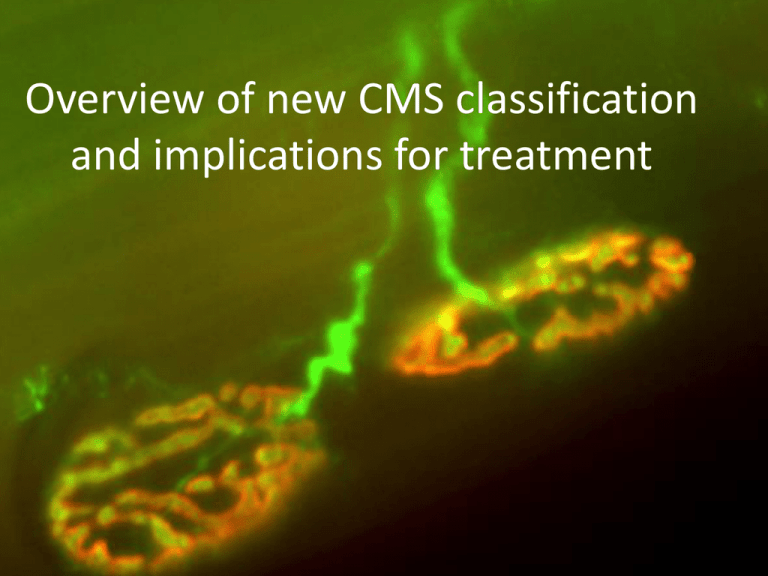
Overview of new CMS classification and implications for treatment Warning • None of these drugs are licensed for use in CMS • They should not be taken without recommendation from an neurologist with expertise in CMS NERVE acetylcholine choline ChAT c acetylcholine receptor Na+ Na+ NERVE MUSCLE JUNCTION Na+ Na+ MUSCLE PRESYNAPTIC SYNAPTIC POSTSYNAPTIC MUSCLE PRESYNAPTIC SYNAPTIC AChE deficient (COLQ mutation) POSTSYNAPTIC MUSCLE PRESYNAPTIC POSTSYNAPTIC MUSCLE NERVE MuSK AChR PTB Rapsyn glycosylation genes DOK-7 Glycosylation pathway glysosylation pathway adds sugar molecules onto a protein glycosylation of AChR → insertion into the post-synaptic membrane ALG2 ALG14 GFPT1 DPAGT1 insert in membrane AChR Mutations that cause CMS: Upper arm and upper leg weakness Eyes: normal Face usually strong Later onset (2yrs on) common EMG and biopsy: muscle disorder >22 Genes: >300 Mutations Fast CS Slow CS AChR epsilon DOK7 COLQ Mike Oldridge, Tracy Lester (NCG service) RAPSN GLYCOSYLATION others AChR deficiency (ε) Other rare subtypes COLQ Fast channel Rapsyn Defects of Glycosylation Slow channel DOK-7 PRE SYNAPTIC CHAT COLQ (AGRIN) POST Abnormal function of AChR AChR deficiency e Slow channel Fast channel AChR ε subunit RAPSYN DOK7 (MUSK) Glycosylation defects ( GMPPB, GFPT1, DPAGT1, ALG2,14), e NERVE ACh breakdown enzyme COLQ AChR MuSK PTB Stabilises NMJ Rapsyn glycosylation genes DOK-7 Nerve terminal AGRIN ACh MUSK Rapsyn Dok-7 stabilises Disorders affecting amount message Reduced message Too much message Slow channel CHAT COLQ AChR epsilon RAPSYN Fast channel Glycosylation defects Disorders affecting stability and structure DOK7 (MUSK, AGRIN) Fast Channel Syndrome AChR single channel recordings of fast channel mutation Adult Normal 6 pA Adult FCS 50 ms Nerve terminal ACh Rapsyn Dok-7 excess destabilises stabilises Slow Channel Syndrome normal Single channel recordings of slow channel mutant AChR (Claire Newland) Overstimulation of muscle → damage takes time to develop hence delay in onset Normal NMJ www.wikipedia.com SCS NMJ Engel AG, Lambert EH, Mulder DM, et al.. Ann Neurol 1982;11:553-569. COLQ mutations: AChE def excess ACh overstimulation Na+ Na+ Na+ Na+ MUSCLE Treatments Increase acetylcholine (ACh) for too little message Pyridostigmine (Mestinon) 3,4-DAP (Firdapse) Blockers of AChR open channels slow channel syndrome Fluoxetine (Prozac) Quinidine Post-synaptic membrane stabilisation Ephedrine Salbutamol (Albuterol) NERVE Pyridostigmine/ mestinon → stops breakdown of ACh Na+ Na+ Na+ Na+ MUSCLE NERVE 3,4-DAP Prolongs the nerve firing ACh MUSCLE Side effects Pyridostigmine/Mestinon Occasionally gastric: abdominal pain and diarrhoea (probantheline) 3,4-DAP tingling in hands and feet (mouth) stimulant, hyperactivity, sleep impairment (? epileptic fits) Slow channel syndrome Open Channel Blockers: • Fluoxetine • Quinidine Nerve terminal Salbutamol Ephedrine ACh receptor Rapsyn Dok-7 stabilises stabilises Ephedrine and Salbutamol Stabilises the nerve muscle junction Gradual reversal of damage over months Side effects faster heart rate, high blood pressure, heart rhythm abnormalities, reduced sleep and stimulation, muscle cramps, Salbutamol muscle cramps Ephedrine high blood pressure, Disorders affecting synaptic function Reduced message AChR epsilon RAPSYN Fast channel Glycosylation defects CHAT Disorders affecting synaptic structure and stability Too much message Slow channel fluoxetine quinidine pyridostigmine/mestinon 3,4-DAP COLQ ephedrine salbutamol DOK7 ephedrine MUSK salbutamol AGRIN Nerve terminal Salbutamol Ephedrine pyridostigmine ACh receptor Rapsyn Dok-7 excess destabilises stabilises stabilises Disorders affecting synaptic function Reduced message AChR epsilon RAPSYN Fast channel Glycosylation defects CHAT Disorders affecting synaptic structure and stability Too much message Slow channel fluoxetine quinidine COLQ pyridostigmine/mestinon 3,4-DAP weak on high dose pyridostigmine ? ephedrine or salbutamol ephedrine salbutamol DOK7 ephedrine MUSK salbutamol AGRIN Thankyou
